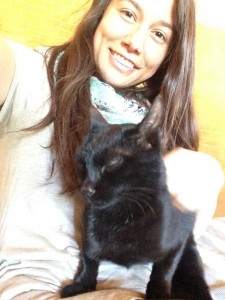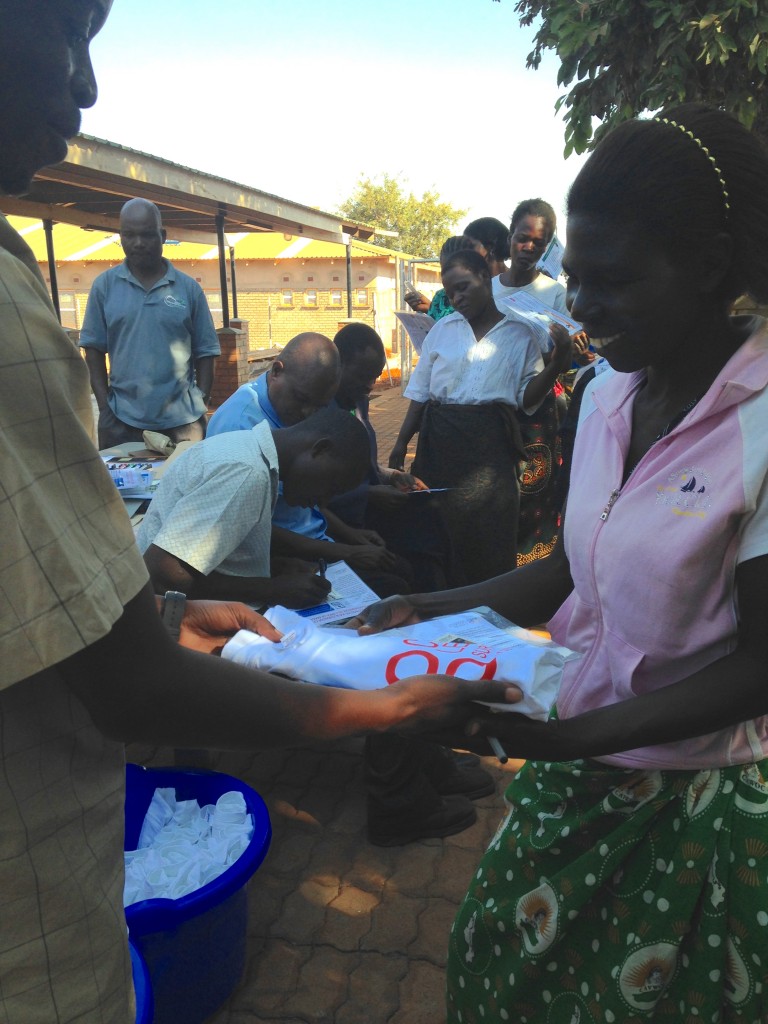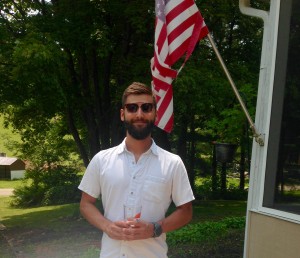



Working remotely is do-able from anywhere in the world, with some planning and patience. After a few trips of trying to tech internationally, I’ve learned a few things. All of them the hard way. Specifically, these tips are helpful for people who might work all-digital in their daily routine, and are going to a place where the tech (read: internets) are not the most reliable.
When I’m not running around like a crazy person preparing for a meeting like yesterday’s, here’s what a typical day at the office looks like:
Breakfast with my roommates, Araseli the CLI hospitality manager and sometimes other people on site.
Eggs with beautiful yokes and indulgent toast is the norm.

For those who were wondering, my coffee solution is perfect and is a hit with others on site.
Breakfast is sometimes rushed so we can hop across the site and get to our morning meeting at the clinic.

Clinic and research staff attend to give updates, ask for feedback on upcoming projects, and raise any issues. There’s usually also a presentation. We saw two last week about malaria diagnosis and treatment. I like how the doctors and ‘superior’ staff take time to share what they learn about new standards and best practices with the broader group. For example, they shared doses for children taking first-line malaria treatment with everyone, even though only a few of those present had authority to prescribe.
Last Friday we used this time to get feedback on the volunteer guide, and the project as a whole, from the clinic and research teams.
After the morning meeting we go to the office. It’s simple, I’ll call it an ‘open workspace’ concept with lots of sun. Everyone works diligently, as a group or quietly on their own, until lunch.
Mzungus eat separate from the rest of the staff, which is kind of a bummer. We do benefit from more variety of the kinds of foods we eat, but “doing as the Malawians do” was more of what I expected. I can’t complain though; they just want us to be happy, and the food is great.
 Sometimes we are served Malawian food; the main staple being nsima, a white cornmeal kind of dough that you mold in your hand and dip in whatever it’s served with. That is usually “relish” which reminds me of southern cooked greens at home; and then sometimes another version with some kind of peanut flour or paste in it. They call it “peanut butter” flavored.
Sometimes we are served Malawian food; the main staple being nsima, a white cornmeal kind of dough that you mold in your hand and dip in whatever it’s served with. That is usually “relish” which reminds me of southern cooked greens at home; and then sometimes another version with some kind of peanut flour or paste in it. They call it “peanut butter” flavored.
Everyone in Malawi gets a 90 minute lunch break: it’s actually the law. So depending on the day I check in on things back at the home front (hi ODEE!), take care of things in my room (like cleaning the shoes I filled with dirt on the walk to the market last weekend) or practice some yoga. It’s super sunny, every day this time of year.
Our afternoon at work is our chance to communicate with people in the states so sometimes we do some of that. The other day it took 30 minutes, two computers, and several phones to connect for a conference call which was still off-and-on connectivity that often required transcription on the typing section of skype while my advisor Alison spoke on her end. It’s an exercise in patience.
 Otherwise, we just do more of whatever we did in the morning. In the afternoon there are fewer people around, as some staff get assigned to work outside the clinic.
Otherwise, we just do more of whatever we did in the morning. In the afternoon there are fewer people around, as some staff get assigned to work outside the clinic.
 We’ve often come back to the room to find Midnight on one of our beds, which is just like home for me. I recently found out that this was ‘against the rules’ though, oops.
We’ve often come back to the room to find Midnight on one of our beds, which is just like home for me. I recently found out that this was ‘against the rules’ though, oops.
Sometimes we work out before dinner. I’m sharing the room with an agriculture volunteer (Mackenzie) and a student researcher (Julika) and the three of us have done circuit training and running. Malawians, of course, think it’s funny that we exercise. I’m glad we can provide them some entertainment while we get some of that extra energy out from all the eating we do.
Sometimes after dinner we play games like bananagrams or puzzles. Usually we make calls home, do some reading and go to bed early. Like, lights out by 9.
That’s a (week)day in the life for me. It’s a nice routine with some wonderful people and a lot shorter to-do list than at home. I’m learning how to multitask effectively–loading a web page can take dozens of minutes and downloading a device driver has proven to take an hour or two. But with all the progress we’ve made already, I’m feeling confident about having a comprehensive system in place by the time I head home.
Zikomo kwambiri (thanks much)!
Lucy
Today was our big volunteer meeting! 63 of the surveillance volunteers from the villages around CLI came to the clinic. We didn’t have a big enough space for everyone inside so we set up in a courtyard outside the research office.
In the last week I’ve developed a community volunteer guide, which helped explain a little about the project and its purpose, the role of the village volunteers, and important information like contact info on who to report the deaths to. It also defines neonatal and maternal deaths to help them identify what a ‘case’ would be.
Check out the English Version | Chichewa Version
The volunteers got these guides, their t shirts, and volunteer IDs. They also got a round of training from my preceptor and the CLI research lead Gladson. The clinic’s head physician addressed the group as well, expressing his appreciation for the project and their involvement.

As with any well attended meeting, refreshments were served.
I had some really great interactions with our participants, even across the language barrier. It was fun getting to meet them in person after seeing their faces from the ID photos.
Planning the logistics of it all was pretty stressful. For our 1 p.m. meeting, attendees arrived anywhere from 11 a.m. to 2:30 p.m. But overall it was a great opportunity to get everyone together. The volunteers asked thoughtful questions and worked together to figure out solutions that fit their communities.
The HSAs (CLI staff who act as liaisons in the villages) got some great face time with virtually all of the community volunteers for their areas at once, which was valuable too. Despite a long gathering, everyone was in high spirits at the end.

In addition to returning volunteers we also had new participants, so now all of the villages in the catchment area should be covered. I’ll verify when the dust settles and the registration forms are compared tomorrow.

My next step is to take a very close look at what happens after the community volunteer level reporting: how the HSA collects information for the audit, how it’s entered into the database, and how it’s analyzed for applications in clinic decision making.
These are just a few of the photos I was able to snap while helping carry on the meeting. I had a fellow volunteer come take more, so stay tuned.
Tionana (see you later!)
Lucy


I made it! With almost all of my stuff and almost no plane sleep.
Which meant 11 hours of deep, deep sleep and waking up to the cleaning staff knocking at the door this morning. My roommate and I arrived at the same time and both slept in and missed the daily 7:30 meeting at the clinic. Oops. We’ll have to do the formal intros at tomorrow’s and hopefully everyone will understand that jet lag is real.
Accommodations are very hotel-like; the bathroom is much nicer than my own at home. The staff is amazing, food is great, and the site is gorgeous. I will take a walk around the premises this weekend to better illustrate in photos.
And, there is a cat. A black cat named midnight who follows people around and commands attention like all great cats should. Malawi is known as ‘the warm heart of Africa’ and the people are living up to the name entirely. I am spoiled here.
In spite of my tardiness, I was pleasantly surprised by how productive my first day was. I got to sit down with the Health Surveillance Assistant who is our main connection to all of the community surveillance volunteers. We reconciled some long lists of participants and their villages that had a bunch of disparities. We have almost 50 volunteers trained, photographed and with IDs made!
I also made a guide for the community volunteers that’s more visual and less text-heavy. We’re going to meet with as many as possible this Tuesday so I’ll be preparing for that in the coming days. Another big project that was supposed to be taking off this month was significantly delayed, so I’m very happy to know that getting my work complete is actually feasible and that the people I need to work with have the availability.
Since I’m meeting with volunteers, I need to learn some Chichewa. Greetings aren’t bad:
Muli Bwanji – how are you?
Ndili bwino, kaya inu? – I am well, and you?
Ndili bwino – I am well
Zikomo – thank you
Ndapita – Goodbye
But things get scary pretty quickly:
Ndithandizeni – Help
Sindikumvetsetsa – I don’t understand
So, fingers crossed I understand everything and never need help.
Photos coming soon, I promise. Ndapita!
The 4th of July is a pretty good day to have your last day in the US before a long trip.
Fun fact: I’ll get to celebrate Independence Day again when I land, as July 6th is the day Malawi attained independence from the British in 1964.
I’m about to leave New York for Johannesburg (kind of can’t believe a single stretch goes that far), with the volunteer IDs, some kwacha, a $60 unlocked droid phone that will work on the global network, all the luggage I could carry and then some.
Wish me luck getting myself and all my stuff to CLI without any h uge hiccups! Thanks for everyone’s sweet well wishes I’ve received in the past week or so, can’t wait to get to work and share it all with you.
uge hiccups! Thanks for everyone’s sweet well wishes I’ve received in the past week or so, can’t wait to get to work and share it all with you.